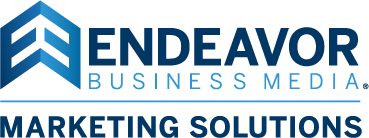The results of Endeavor Business Media’s 2023 Marketing Benchmark Survey are in: 61% of respondents stated their intent to invest more in content marketing over the next year. And while the majority of respondents rated their content marketing strategies as effective or extremely effective, 59% said that their budget is the biggest obstacle to successfully executing a content marketing strategy, followed by a lack of internal resources and difficulties in developing a strategy.
So, while the value of content marketing is clear, many businesses struggle with how to get started and how to do it right. And that’s where we come in.
Understanding Content Marketing
Content marketing is the strategic creation and distribution of various types of content assets, including articles, research reports, white papers, videos, and podcasts, for promotional usage. These assets are designed to raise awareness, establish thought leadership, foster engagement, generate leads, and boost revenue.

The Intersection of the Buyer’s Journey and Content Marketing
Content marketing is not just about creating content; it’s about creating the right content that aligns with the stages of the buyer’s journey.
“When looking at content marketing, it’s extremely important to follow the buyer’s journey to fulfill the need of the buyer as they advance from discovery to making a purchasing decision,” explains Jacquie Niemiec, chief digital officer at Endeavor Business Media. “Taking an inventory of your current content and content types and mapping to your buyer’s journey allows you to identify where you have content creation gaps.”
The buyer’s journey typically consists of three stages:
- Awareness: During the awareness stage, the buyer realizes they have a need or a problem. They may also be looking for new ideas to grow their business. Your content at this stage should acknowledge these pain points and, perhaps, gently suggest how your company has the experience and expertise to address these pain points. Content types could include research reports, podcasts, explainer videos, blogs, and short-form content like our Ask the Experts or Top Tips.
- Consideration: In this stage, the buyer has a more comprehensive understanding of the problem and is seeking to understand how to solve their problem or meet their need. Accordingly, the most content consumption occurs during this phase as the buyer is exploring their options and comparing your product or service to what your competitors offer. Content types such as how-to and technical content, application videos, white papers, FAQs, and eBooks are most effective here.
- Decision: Finally, during the decision stage, the buyer is close to making a purchase now that they have done the necessary research and have a good understanding of how a particular solution can solve their challenge or need. They may still be seeking a final decision on which company to partner with, or they may be trying to get buy-in from other stakeholders in their company. In this stage, offer vendor comparisons, product spec sheets, case studies, and product videos or demos to nudge them toward that final decision.
While the buyer’s journey has three basic steps, many businesses underestimate where they need to invest more time and budget into content creation.
“When working directly with clients, we typically see a lopsided chart where the “decision” content is heavier skewed with product spec sheets, product videos or product evaluations content assets while the awareness and consideration may only have few assets available,” Niemiec says. “While lead generation is the top priority for most companies, it’s important to move buyers through the marketing funnel, supplying content at every stage. This way when a lead is ready to buy, your company is top of mind.”

Where Content Marketing Fits in Your Marketing Strategy
Competition for your customer’s attention is at an all-time high. Buyers have access to a wealth of information through digital channels, making it easy to gather information independently.
“Buyers often consume an average of 13 pieces of content before deciding on a vendor,” Niemiec says. “This means sellers have less access and fewer opportunities to influence customer decisions. Strategized and properly executed content that is used for inbound and outbound marketing campaigns helps increase the volume of quality traffic to your website, converting leads to sales and promoting growth.”
As a crucial component of any marketing strategy, content marketing also boosts your SEO efforts. Google rewards valuable, unique, and quality content with higher rankings, making your company more visible to potential customers.
Getting Started with Content Marketing
As the respondents in our Marketing Benchmark Survey revealed, most understood the importance of investing in content marketing but many struggle with limited resources or internal expertise. However, there are steps you can take to kickstart your journey:
- Review your data: Google Analytics, marketing automation/email platform reports and social engagement metrics can provide insights into what content types and topics are resonating with your audience.
- Conduct research: A recent customer survey by Endeavor Business Media revealed that 81% of marketers leverage research results to inform marketing decisions and guide their strategies. Research can provide a deeper understanding of trending topics, target audience challenges, and reveal perceptions about your company and your solutions. It can also provide insight into how they view your competitors so you can differentiate yourself in the market.
- Create a content calendar: Take an inventory of your current content and note whether the content will be effective for promotions. Doing a content gap analysis can help you identify what you’re missing, shaping your plan for future content creation and ensuring a consistent flow of content. Be sure your content caters to each stage of the buyer’s journey.
- Develop a distribution strategy: Your content may be ready, but the best content is entirely useless if nobody can find it. Develop a strategy to promote your content through social media, email marketing, and your company website, and partner with media brands to target their audience of decision-makers in your industry.
Endeavor Business Media’s Marketing Solutions team offers comprehensive content marketing services. We can help you develop and execute a content strategy and create compelling, educational content that makes a big impact. We combine our years of content marketing expertise with access to engaged audiences and trusted brands, ensuring that your content is delivered the right way, through the right format, and at the right time.
Read the full EBM B2B Marketing Benchmark Report here. Still not sure where to start? Reach out to us.


![[Free Guide] 7 B2B Targeting Strategies to Reach High-Value Buyers More Effectively](https://marketingsolutions.endeavorb2b.com/wp-content/uploads/2025/05/Blog-photos-1-400x250.jpg)
![[Webinar] How to Stay Ahead in Automotive Marketing: Key Trends and Strategies for 2025](https://marketingsolutions.endeavorb2b.com/wp-content/uploads/2025/05/IMR-Webinar-400x250.png)
